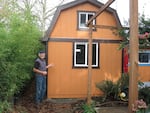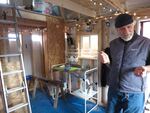
Michael Kuhn turned his garden shed into an earthquake emergency shelter.
Kristian Foden-Vencil / OPB
A tree blew down across Michael Kuhn’s driveway earlier this year, crushing his car and cutting the electricity.
That got him thinking about the big one — a massive earthquake predicted to strike off the Oregon coast.
Kuhn bought a garden shed and put it on a bed of gravel so it could roll around undamaged in an earthquake. He strengthened the walls, installed a small sleeping platform and bought mobile solar panels so he could charge a phone. He also is planning on installing plumbing for water and adding a composting toilet to his shelter
“This is not going to be a habitable structure, except in an emergency,” said Kuhn.
And that is a key distinction for Kuhn. City regulators require a building permit if someone is going to live in an accessory structure.
Ross Caron with the City of Portland said a small accessory structure like a garage or shed (under 200 square feet) doesn't need a full building permit. If it has electricity, it needs an electrical permit. Or if it's plumbed for water, it needs a plumbing permit.

Michael Kuhn is putting power, water and a sleeping platform in his garden shed so it can be used as shelter after an emergency.
Kristian Foden-Venci / OPB
Caron said as long as builders like Kuhn do not live in the shed, it's not likely to be an issue, although the emergency shed would technically be illegal after a disaster if someone took up residence there.
“With that said, the likelihood of us investigating something like that, especially in the aftermath of an emergency would be extremely low,” Caron said.
Caron said the city would also quickly identify public emergency shelters after an earthquake.

